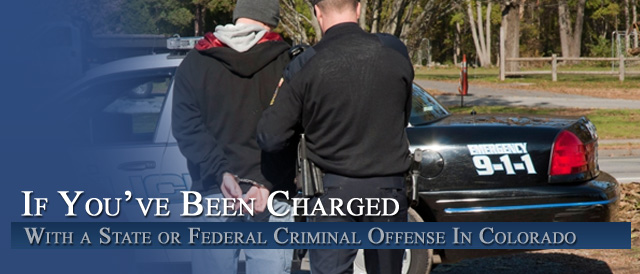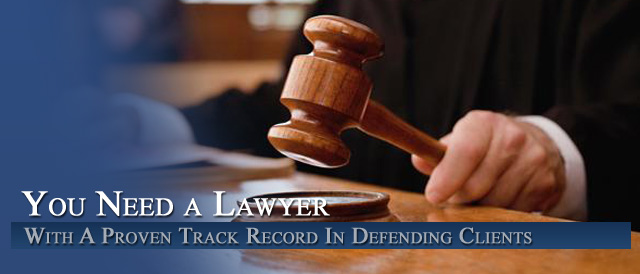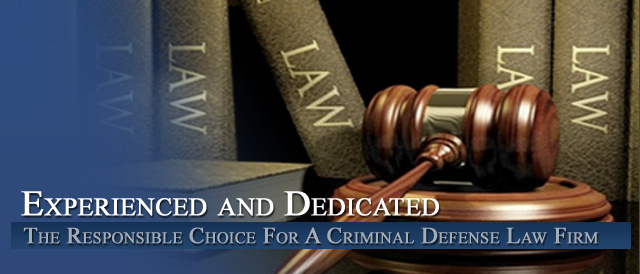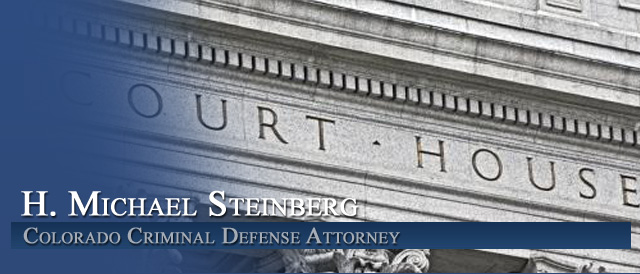




Colorado Criminal Juvenile Law – The Strategy Behind Filing Pre-Trial Motions
by Colorado Juvenile Criminal Defense Attorney – H. Michael Steinberg
Motions can be an effective tool in any adult or juvenile criminal case in Colorado. Filing certain motions can be a tactic or strategy that helps he lawyer to uncover the strength or weaknesses in his or her opponent’s case. This article addresses filing Motions in Colorado.
Pretrial motions practice is crucial to effective defense work. Successful litigation of motions can win the case — either by producing outright dismissal of a Petition (for example, when the defense prevails on a motion challenging the legal sufficiency of the Petition or the jurisdiction of the court) or by excluding evidence that the prosecution needs in order to win the trial (for example, when the defense prevails on a motion to suppress tangible evidence, confessions, or identification testimony).
The Benefits of Losing A Motion
Even when the defense loses a motion, there are often net benefits to litigating it.
Motions practice serves as a highly effective discovery technique; the prosecutor’s written and oral responses to the defense motion, and evidentiary hearings held on the motion, provide the defense with information about the prosecution’s case that it would not otherwise have learned.
When a motion generates an evidentiary hearing, defense counsel gains an opportunity to pin down prosecution witnesses on the record, developing transcripts that can be used at trial to impeach the witnesses with prior inconsistent statements.
The defense also gains other fringe benefits from motions practice. The judge’s ruling on the motion may provide a fertile source of reversible error on appeal.
Motions To Discover The Cases For A Plea Bargain
In cases in which a guilty plea is under consideration but counsel is not sure about the strength of the government’s case, an evidentiary hearing on a motion to suppress can provide a preview of the prosecution’s evidence that will enable counsel to evaluate realistically the wisdom of the offered plea.
If the lawyer has concluded that a plea is wise but the juvenile is unconvinced, the juvenile’s observation of the prosecution’s witnesses at an evidentiary suppression hearing may change the juvenile’s mind and enable him or her to reach the right decision.
In instances in which police conduct is particularly reprehensible, the unpleasant prospect of its exposure at a motions hearing may occasionally persuade the prosecutor to drop the charges or may give the defense considerable leverage in plea bargaining.
Juvenile Criminal Motions Hearings
Hearings on motions, whether they are evidentiary hearings or oral arguments, may strengthen the attorney-juvenile relationship and lead the juvenile to place greater trust in the attorney’s advice generally, since the juvenile sees the attorney fighting for him or her in court.
What Motions Should Be Filed In A Colorado Juvenile Criminal Case?
Lawyers need to make a decision early in the case about what motions to file. In Colorado most judges – by rule – establishes a deadline (usually 15 days or 30 days after arraignment) for filing motions.
The defense lawyer should begin by examining the Petition to determine whether it contains deficiencies that render it subject to a motion to dismiss. Other grounds for dismissing the Petition that counsel should consider are jurisdictional defects, and double jeopardy.
If the charges in the Petition are based on more than one incident, the lawyer should consider a motion to sever counts, and if the juvenile is charged jointly with one or more co-respondents,counsel should consider a motion for severance of respondents. In rare cases motions for consolidation of charges or respondents may be advisable.
Tangible Evidence Motions
On the basis of the lawyer’s interviews with the juvenile and discovery from the prosecution, he should determine whether the prosecution’s case is likely to include any tangible evidence seized from the respondent, any confessions or admissions by the respondent, or any identification testimony. If so, he should evaluate the potential of a motion to suppress evidence (confessions and admissions, identifications).
If the discovery process has proven inadequate and the prosecutor has refused to turn over information that the defense requires, counsel should file motions for discovery and should also consider motions for sanctions if counsel learns that evidence has been destroyed or that the prosecutor has told witnesses not to talk with counsel or defense investigators.
Motion to Change Venue – Recusal (Removal) of The Judge
The lawyer then should give thought to the trial forum. While rarely granted, If there are reasons to believe that the respondent would not receive a fair trial in the jurisdiction in which the case is presently pending, the lawyer can file a motion to change venue. If there are reasons to believe that the judge presiding over the case may not be impartial, the lawyer can file a motion for recusal.
If there is a right to a jury trial ( which is allowed in some instances in Colorado juvenile criminal cases) the lawyer will want to consider motions to challenge aspects of juror selection.
Motions On Expert Witnesses
Depending upon the theory of the case that the lawyer chooses, the lawyer may need to retain expert witnesses.
More Or Less Time Based Motions
Developments during the pretrial stage may necessitate motions addressed to the timing of pretrial proceedings and trial. It may become strategically desirable to advance the date of pretrial hearings, the trial, or both, or the lawyer may want to file a motion for a continuance in order to gain more time for investigation and preparation.
If the prosecution seeks a continuance, the lawyer may respond with a motion to dismiss for want of prosecution or on grounds of denial of a speedy trial or both.
Local practice may give the defense the option of raising certain defenses and contentions either by pretrial motion or at trial. The lawyer should consider the following reasons for and against litigating a motion prior to trial.
Reasons for Litigating an Issue by Pretrial Motion
Election of the pretrial motion forum ordinarily results in an earlier adjudication of the issues raised. This may be important not only when success on the issues will require dismissal of the entire prosecution, so that termination of the case in the respondent’s favor is expedited, but also when success on the issues will weaken the prosecution’s litigating posture or morale and thereby increase the defense’s leverage in plea bargaining.
Conversely, when there is substantial likelihood that the defense will lose the issues no matter when they are presented, they may be more effective bargaining counters if mentioned to the prosecutor during plea negotiations as contentions that the defense intends to raise at trial rather than being raised and definitively lost prior to the negotiation.
A major reason to opt for the pretrial motion forum is that the defense may thereby be able to obtain extensive discovery of the prosecution’s case that can then be used to improve defensive investigation and trial preparation.
Some Sample Pre-Trial Juvenile Criminal Motions
Pretrial Motions in a Colorado Criminal Case
Before a trial, a slew of motions may be filed by the defense, which may greatly alter the charges being faced by a defendant, or in some cases, have them dismissed outright. Some of the commonly filed motions before a trial, include:
• Motion to modify bail, which requests a judge modify a defendant’s bail status
• Motion to dismiss complaint, which request the judge to dismiss a case on the basis of a insufficient criminal complaint against a defendant
• Motion for bill of particulars, which if approved by a judge, will require the prosecutor to detail all charges, as well as the reason for filing these charges
• Motion to reduce charges, which requests a judge reduce charges to accurately charge a defendant for an alleged criminal incident
• Motion for change of venue, which defendants request their judicial proceedings be moved elsewhere to ensure a fair trial
• Motion for to strike a prior conviction, which if approved by the judge, will potentially prevent a defendant from facing the penalties and other sentencing guidelines associated with a repeat offender or person with a criminal record
• Motion for discovery, which is a formal request for the prosecution to turn over all evidence they possess regarding a defendant’s case
• Motion to preserve evidence, which forces the prosecution to preserve all evidence until a defense investigator or expert can evaluate the evidence
• Motion to disclose identity of an informant, which if approved, will allow the defense to attack the credibility of an informant’s motives and testimony
• Motion to examine police personnel file, which can be requested if a law enforcement officer’s past conduct and history is relevant to the defense’s existing criminal charges
• Motion to suppress evidence, which if approved, will allow the defense to exclude certain pieces of evidence that were obtained illegally, coerced, or tainted in some manner
• Motion for speedy trial, which can expedite the process of a trial to prevent government entities from refusing to release a defendant, but also, not brining the individual to trial for any actual crime
Please Call Our Firm If You Have Questions About:
The Strategy Behind Filing Motions in Colorado Juvenile Cases
H. Michael Steinberg has been a Colorado criminal law specialist attorney for 40 years. For the First 13 years of his career, he was an Arapahoe – Douglas County District Attorney Senior prosecutor. In 1999 he formed his own law firm for the defense of Colorado criminal cases.
In addition to handling tens of thousands of cases in the trial courts of Colorado, he has written hundreds of articles regarding the practice of Colorado criminal law and frequently provides legal analysis on radio and television, appearing on the Fox News Channel, CNN and Various National and Local Newspapers and Radio Stations. Please call him at your convenience at 720-220-2277
If you have questions about Filing Motions in Colorado Juvenile Cases in the Denver metropolitan area and throughout Colorado, attorney H. Michael Steinberg will be pleased to answer those questions and to provides quality legal representation to those charged in Colorado adult and juvenile criminal matters and can help you as an expert in Colorado Criminal Juvenile Law.
Other Articles of Interest:
- Juvenile Records Law
- Colorado Juvenile Criminal Law and Issues – Common Motions – Police Stops
- Colorado Juvenile Expungements Sealing Of Juvenile Records
- Charging a Juvenile as an Adult in Colorado
- Colorado Criminal Law – Juvenile Criminal Law – When a Child Can Be Prosecuted As An Adult*













